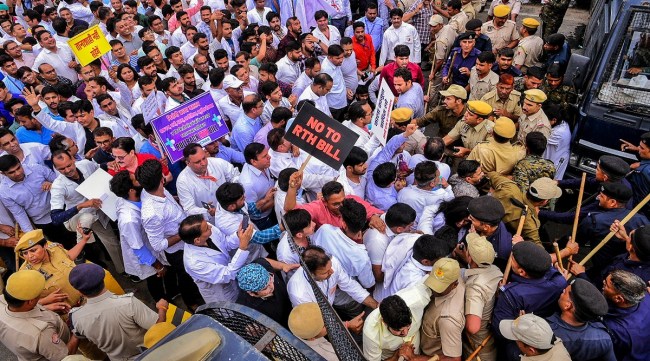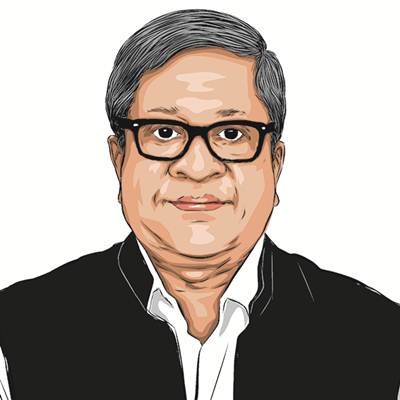Opinion Rajasthan’s Right to Health Bill hurts the private health services
Having failed to upgrade its own medical services, Rajasthan government is imposing its populism on the private sector. This is imprudent
 Doctors stage a protest against Rajasthan's Right to Health Bill, at Statue Circle in Jaipur. (PTI)
Doctors stage a protest against Rajasthan's Right to Health Bill, at Statue Circle in Jaipur. (PTI) I have always considered a good government as one that provides for necessities. The real test of good governance is to provide for clean water, uninterrupted and stable power supply, public transport, basic hygiene and cleanliness which can be availed by all — from Ambani (or Adani) to me to the least privileged. This way, the government facilitates a culture for people to work to the best of their abilities. In addition, as Amartya Sen suggests, governments should safeguard people’s well-being and interests in times of natural disasters or medical emergencies.
The most important asset of a nation-state is its people and the governments should invest in people — skill acquisition, health, and education. When people grow, the nation grows. Consider education: The initial vision of our founding fathers resulted in the establishment of excellent institutes of technical learning (IITs) and medical support (AIIMS), followed by many institutions at varying levels — NITs and state medical colleges. The Centre and states provided for primary and basic education, where most before my generation studied. But somewhere, we changed track.
The state could not provide for education and non-government schools filled the gap. Some of these schools were founded by Christian missionaries, by other communities, and some by philanthropic organisations. These schools provided for what the state could not. With the success of these schools, many more private ventures, including family-run schools, came into existence, most of which are very popular amongst the upper strata of society, who gave up on government schools.
To provide better and more opportunities created by hiring the best instructors, these private schools steadily increased the fees. The success of these schools underlined the failure of the government in this sector. The government did not accept it and instead made laws curtailing the rise in fees. Providing education to all was the responsibility of the government — it failed — and it could not gracefully accept the rise of private players doing well, so it decided to intervene, and my gut feeling is, it will steadily destroy these schools also, much as the government destroyed government schools, without ever showing any intention of improving them, even though the methods suggested by many were very simple.
Rajasthan’s recent bill “Right to Health” appears a close parallel. Good health can be ensured by providing good drinking water, hygienic living conditions, and clean cities. A regulated traffic system and good public transport system will bring down accidents and decreased corruption in governments will reduce accidents due to bad roads and collapsing bridges.
What the government refers to as the “right to health” is a misnomer for its intention to provide the right to medical treatment. Sure, every citizen has the right to medical treatment and diagnosis. The question is, who should be responsible for it? The government. Having miserably failed in its responsibility, the government tries to sabotage private health services, in as much as it intervenes in schooling and higher education.
The purpose of the government should be to provide excellent support and services in every sector, setting and raising bars for the private operators. The Bill seems to do the opposite. Good (excellent) service is always available at a cost. When the desired cost is not met, there will always be a compromise in service, thereby lowering standards. The Rajasthan government wants the doctors and hospitals to provide near-free mandatory service to all. But it wants to enforce the right rather than act as a role model.
Given that 2023 is the election year, what will be the likely result of this Right to Health bill? I fear this will spell doom – in more ways than one.
With increasing age, I have moved to private health insurance and shifted to private hospitals for my needs because the parent organisation of this pensioner takes infinite time to pay his bills (if it does it at all). I do not have the patience to go to overcrowded government establishments since the government has failed miserably in providing a proportionate increase in facilities.
The medical fraternity saved us several times during the pandemic — selflessly, putting themselves at such great risk.
On all my consultancy visits to the regular and other specialised doctors, I have asked endless questions, which the doctors have very kindly answered. A healthy relationship between the patient and doctor is nurtured by both. The proposed bill infringes on the rights of the doctor.
This is not to say that governments should not have the power to check malpractices. However, it would be imprudent to expect private establishments to be partners in implementing the government’s populist policies.
I hope wisdom will prevail, and there will be a way out of the present impasse. I wish that the government understands the concerns of the doctors. I also wish that the government does enough to encourage youngsters of the next generation(s) to choose this profession for its own sake.
The writer, a retired professor of physics, is a resident of Jaipur




